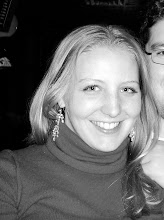Below is a devotion that I prepared for my home church's annual meeting on 25 January. I was able to deliver it via Skype. Many thanks to all the people that made this connection possible. This reflection is based on Jonah 1:1-4 and Mark 1:16-20.
Am I a Jonah or a James? Am I a runaway prophet or a disciple of Christ? I ask myself those questions every day. Even though I’m living and serving in South Africa as a called and commissioned volunteer, I’m no different from you. God is not only calling me to service. He’s calling every single one of us. How will we answer that call? Are we even listening for that call? When God said to Jonah, “Go at once to Ninevah,” he ran in the opposite direction. (And we all know what happened to Jonah.) But when Jesus said to Simon, Andrew, James, and John, “Follow me,” they left what they were doing immediately. They didn’t say, “Wait! Let me tie up some loose ends first,” or even, “Wait! Let me say goodbye to my friends and family.” James and John left their father behind in their fishing boat that very moment. How many of us practice that kind of radical obedience to Christ’s call in our daily lives? I know that I fall painfully short.
We like to think that we’re disciples, that when Jesus calls we will immediately answer. But so often we are more like Jonah. When Jesus calls, we have so many excuses: “I’m busy. I’m already overcommitted. I have responsibilities. I can’t fit one more thing into my life. I don’t have time.” But like Jonah, what we’re really saying is that we’re scared. We’re scared that when Jesus calls we might have to think in entirely new ways, that our relationships might have to change, that we might have to use our time and resources differently. We’re scared of what God might be capable of, that He might actually be gracious, merciful, slow to anger and abounding in steadfast love.
I’ve heard that Emanuel considers its budget to be not only a moral, but a theological, statement. (I say this now, because experience has taught me that discussing finances is often the most contentious part of an annual meeting.) I would like to take this idea several steps further. Not only your budget, but everything you do at Emanuel, is a statement of your faith, your priorities, and your commitments. When you ask yourselves if you’re runaway prophets or disciples of Christ, you will have to answer both. We are both sinners and saints; part of a broken, sinful humanity and children of God. We live in that tension, but we are also called to live less and less like Jonah. So I challenge you, the people of Emanuel, to continually ask yourselves, where is God calling you today, in this very moment? How will you answer, as a Jonah or a James?
27 January 2009
08 January 2009
The Hard Way
 “Where is everything?” I was speaking with an acquaintance before a council meeting in the sanctuary of a church. We chatted about my work at the crèche. She then proceeded to walk from the sanctuary to the fellowship hall where the crèche is housed during the week. As she peered into the dim room, she asked, “Where is everything?” She had expected the hall to be completely changed as a result of my work in a few short months and could not hide the disappointment on her face when it looked exactly the same. Although she quickly realized how unrealistic her expectations were, I could not help but think that she was confusing me with a miracle worker.
“Where is everything?” I was speaking with an acquaintance before a council meeting in the sanctuary of a church. We chatted about my work at the crèche. She then proceeded to walk from the sanctuary to the fellowship hall where the crèche is housed during the week. As she peered into the dim room, she asked, “Where is everything?” She had expected the hall to be completely changed as a result of my work in a few short months and could not hide the disappointment on her face when it looked exactly the same. Although she quickly realized how unrealistic her expectations were, I could not help but think that she was confusing me with a miracle worker.There is a strong temptation here to do the easy thing, to write an e-mail home requesting funds to support the crèche. As my home congregations generously support my time here to South Africa, I have no doubt that they would also support extremely poor children, though they have only seen in pictures on my blog, especially if they knew that I was working with them directly. Their generosity and good faith are truly a blessing. With the favorable exchange rate, even a few hundred US dollars could provide copious amounts of new stationary, books, toys, and even clothing and food. The staff and learners at the crèche would be extremely pleased, being slightly lifted out of a dire financial situation. I would feel great about myself, because I had actually “done something” with my time in SA. My sending communities would also feel great, because they would be supporting my “doing something.” Superficially, everyone would be happy. A good deed would be done. But what happens in another year when I’m gone? Where will the books and toys come from then? Although significantly more difficult, I am working with local resources and expertise to create sustainable changes at the crèche.
“People are coming to paint the kitchen?” I was in a meeting with a pastor and the principle of the crèche. We talked about the institutional relationships between the church and the crèche itself. We brainstormed strategies for creating more parishioner involvement with its affairs, as most have little or no connection with them. Toward the end of the conversation the pastor mentioned there were plans for a short-term mission team from Europe to paint the kitchen while they were visiting Pietermaritzburg. Although perhaps not in perfect condition, there is no pealing or seriously discolored paint in our crèche kitchen. “They’re planning to paint the kitchen? I can think of a hundred things they could do besides paint the kitchen! Why didn’t they ask us what we could use?” I said.
This is typical of so much of the development work in Africa. A well-intentioned short-term
 mission team or a donor-backed NGO swoops into a township, or any other very poor community, with a plan to “fix things.” Little, if any, consultation with the local population is done, and there is often little regard for the hierarchical social structures already in place. No one had asked the principal of the crèche what improvements she would find most helpful. Questions such as, “What do you think this community needs?” and “Whose approval do I need to carry out this project?” most are often not asked, because there is an assumption that they already know what is needed.
mission team or a donor-backed NGO swoops into a township, or any other very poor community, with a plan to “fix things.” Little, if any, consultation with the local population is done, and there is often little regard for the hierarchical social structures already in place. No one had asked the principal of the crèche what improvements she would find most helpful. Questions such as, “What do you think this community needs?” and “Whose approval do I need to carry out this project?” most are often not asked, because there is an assumption that they already know what is needed.How could it possibly be a bad thing for people in the developed world to contribute, through a partner, directly to people in the developing world? How could it possibly be a bad thing that a group of university students goes to Africa instead of Myrtle Beach for spring break? These are well-meaning efforts, but ones that often go awry because of the substantial complexity of development work. There are no “quick fixes” or “feel good” moments in confronting the daily realities of systemic socio-economic inequality. (Although there are moments of real joy.) A nuanced, discerning approach is needed that requires a knowledge of the bureaucratic structures of both government agencies and NGOs, grant writing procedures, availability of local resources, health and public safety issues… This list goes on ad infinitum. Development work happens in a complex web of constantly changing socio-economic and political forces.
 This is not to say that you should not support development work because it is something to be left to “experts.” But it does require a discerning, informed approach. You should invest in development organizations and short-term missions trips. But as Americans we like to throw money at “problems.” It makes us feel better, because there is an illusion that we’re actually helping accomplish “something,” although that something is far removed from ourselves. So yes, donate to development organizations and support mission initiatives, but be discerning in how you use your money. Instead of sending shoeboxes of cheap toys and toothpaste once a year for Christmas, consider supporting programs that seeks sustainability, programs that accompany and invest in their companions instead of trying to “fix” them. Sustainable development does not depend on a one-time hand out, as good as that may feel, but demands real engagement, not only with issues and statistics, but more importantly, with the people on the ground. Instead of objectifying “the poor,” development calls for building relationships with people that are poor. I pray that we have the wisdom to know the difference between helping “the poor” and accompanying people.
This is not to say that you should not support development work because it is something to be left to “experts.” But it does require a discerning, informed approach. You should invest in development organizations and short-term missions trips. But as Americans we like to throw money at “problems.” It makes us feel better, because there is an illusion that we’re actually helping accomplish “something,” although that something is far removed from ourselves. So yes, donate to development organizations and support mission initiatives, but be discerning in how you use your money. Instead of sending shoeboxes of cheap toys and toothpaste once a year for Christmas, consider supporting programs that seeks sustainability, programs that accompany and invest in their companions instead of trying to “fix” them. Sustainable development does not depend on a one-time hand out, as good as that may feel, but demands real engagement, not only with issues and statistics, but more importantly, with the people on the ground. Instead of objectifying “the poor,” development calls for building relationships with people that are poor. I pray that we have the wisdom to know the difference between helping “the poor” and accompanying people.
Subscribe to:
Posts (Atom)

